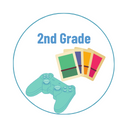The First 20 Days of Math: A Comprehensive Guide
In the journey of learning mathematics, the initial days play a pivotal role in shaping a student's understanding and attitude towards the subject. It is during these crucial days that educators lay the foundation upon which further mathematical concepts will be built. Therefore, it is imperative to approach the first 20 days of math instruction with careful planning and effective strategies to ensure optimal learning outcomes.
Understanding Math Foundations
The first step in teaching math effectively is to establish strong foundational concepts. This involves introducing students to basic arithmetic operations such as addition, subtraction, multiplication, and division. By mastering these fundamental operations, students develop the necessary skills to tackle more complex mathematical problems with confidence. Continue below >>
Multiplication Games | Addition Games| Subtraction Games | Telling Time Games | Fraction Games |
Kindergarten Math Games

Play free preschool and kindergarten math games for kids. Fun math activities for kindergarten
Go to page1st Grade Math Games

Math games for 1st grade students to play games and practice different math topics. Maths games for class 1
Go to page2nd Grade Math Games

2nd grade math games for kids to play and practice math problems. Maths games for 2nd class
Go to page3rd Grade Math Games

3rd grade math games for kids to play and practice math problems. Maths games for class 3
Go to page4th Grade Math Games

4th grade math games for kids to play and practice math problems. Fun math activities for 4th graders
Go to page5th Grade Math Games

5th grade math games for kids to play and practice math problems. Cool math games for 5th graders
Go to page6th Grade Math Games

6th grade math games for kids to play and practice math problems. Math jeopardy 6th grade.
Go to page7th Grade Math Games

7th grade math games for kids to play and practice math problems. Math games for grade 7
Go to page
Interactive Learning Methods
One of the most effective ways to engage students in math learning is through interactive activities. Incorporating games, puzzles, and hands-on experiments not only makes learning enjoyable but also reinforces key concepts. Interactive learning encourages active participation and fosters a deeper understanding of mathematical principles.
Exploration of Number Patterns
Recognizing and analyzing number patterns is a crucial skill in mathematics. During the first 20 days of instruction, students should be exposed to various patterns and taught strategies for identifying and extending them. By understanding number patterns, students develop problem-solving skills that are essential for success in math.
Introduction to Basic Geometry
Geometry is another fundamental branch of mathematics that students encounter early on. In the first 20 days, educators should introduce basic geometric concepts such as shapes, lines, and angles. Hands-on activities, such as building shapes with manipulatives or drawing geometric figures, help solidify understanding and make geometry more tangible for students.
Enhancing Problem-Solving Skills
Problem-solving lies at the heart of mathematics. During the initial days of instruction, students should be challenged with a variety of problems that require critical thinking and creative solutions. By practicing problem-solving regularly, students develop resilience and perseverance, essential qualities for mathematical success.
Encouraging Mathematical Discussions
Creating a collaborative learning environment where students can discuss and share their mathematical ideas is essential. Group activities, peer teaching, and class discussions promote deeper understanding and help students learn from each other's perspectives. Encouraging mathematical discourse fosters a sense of community and empowers students to articulate their reasoning.
Incorporating Visual Aids
Visual representations are powerful tools for enhancing mathematical understanding. Charts, graphs, diagrams, and models help students visualize abstract concepts and make connections between different mathematical ideas. Integrating visual aids into instruction makes math more accessible and engaging for students of all levels.
Introduction to Measurement
Measurement is an integral part of everyday life and an essential concept in mathematics. During the first 20 days, students should be introduced to units of measurement and taught how to measure and compare objects. Practical examples and hands-on activities make learning about measurement more meaningful and relevant to students' lives.
Fostering a Growth Mindset
It is important to instill a growth mindset in students when teaching math. Emphasizing the value of effort, persistence, and resilience helps students overcome challenges and develop a positive attitude towards learning. Encouraging students to embrace mistakes as opportunities for growth fosters a culture of continuous improvement in the classroom.
Introduction to Fractions
Fractions can be challenging for many students, but they are an essential concept in mathematics. During the first 20 days, educators should introduce fractions in a clear and accessible manner, using visual aids and real-world examples to illustrate concepts. Hands-on activities, such as cutting shapes into equal parts or sharing food items, help students grasp the concept of fractions concretely.
Building Confidence in Math
Building students' confidence in math is crucial for their long-term success. Educators should provide plenty of opportunities for students to experience success and celebrate their achievements, no matter how small. By creating a supportive learning environment where students feel valued and encouraged, educators can help instill a sense of confidence and competence in their mathematical abilities.
Exploring Data and Graphs
Data analysis and interpretation are essential skills in the modern world. During the first 20 days of math instruction, students should be introduced to basic data analysis techniques and taught how to create and interpret simple graphs. Real-world examples and hands-on activities make learning about data engaging and relevant to students' lives.
Practicing Mental Math
Mental math skills are invaluable for solving problems quickly and efficiently. Educators should incorporate regular mental math exercises into their instruction to help students develop calculation fluency and number sense. Tips and tricks for mental math, such as using number bonds or breaking numbers into easier-to-manage parts, can help students become more confident and proficient in their mathematical abilities.
Review and Reinforcement
Regular review and reinforcement are essential for solidifying learning and ensuring retention. Educators should regularly revisit previously learned concepts and provide opportunities for students to practice and apply their knowledge independently. Formative assessments, quizzes, and homework assignments can help gauge student understanding and identify areas for further review.
Conclusion
The first 20 days of math instruction are critical for laying the groundwork for future mathematical success. By employing effective teaching strategies, fostering a growth mindset, and creating a supportive learning environment, educators can set students on the path to becoming confident and proficient mathematicians.
FAQs
-
How can I help my child succeed in math during the first 20 days of instruction?
- Encourage your child to practice regularly, provide support and encouragement, and communicate with their teacher to address any challenges they may be facing.
-
What if my child struggles with certain math concepts during the first 20 days?
- It's important to communicate openly with your child's teacher and seek additional support or resources if needed. Practice patience and encourage perseverance as your child works through challenging concepts.
-
Are there any online resources or apps that can help reinforce math learning during the first 20 days?
- Yes, there are numerous online resources and educational apps available that offer interactive math activities, games, and tutorials tailored to various grade levels and learning styles.
-
How can I make math learning fun and engaging for my child during the first 20 days?
- Incorporate games, puzzles, and hands-on activities into your child's math practice. Look for opportunities to apply math concepts to real-life situations and encourage curiosity and exploration.
-
What role do parents play in supporting their child's math learning during the first 20 days?
- Parents can provide encouragement, assistance with homework, and opportunities for math-related activities outside of school. It's also important for parents to communicate with teachers and stay informed about their child's progress in math.










